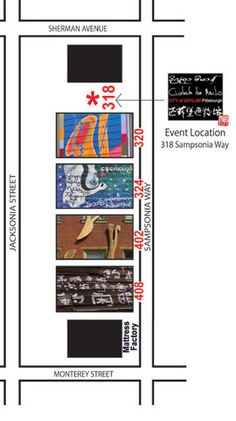Q&A With Horacio Castellanos Moya: “When something is burning inside you, you can write in any conditions anywhere.”
by Sampsonia Way / July 22, 2011 / 1 Comment
Horacio Catellanos Moya’s latest novel Tyrant Memory was published last month by New Directions Press. In her New York Times review Sheila Glaser writes “Castellanos Moya’s sharp urban ironies give way to the rhythms of life in a provincial Latin American capital.” Sharp, ironic, and controversial are the adjectives used most to describe his work.
Castellanos Moya is the former writer in residence of City of Asylum/Pittsburgh and cofounder of Sampsonia Way magazine. Sampsonia Way has already published a long interview with him and excerpts of his work, so to celebrate his new book, we decided to bombard him with 15 questions about literature and his craft. “Be short in your answers,” we said… “Be clever in your questions,” he responded.
We also asked him to select some fragments from Tyrant Memory to share with you. Read the excerpts here.
What are the writers and books you come back to read?
French aphorists of the 17th and 18th century, German-speaking writers of the late Austrian-Hungarian empire, The Greek tragedians, Virgil, Cervantes, Onetti.
What is the narrative technique that gives you the hardest time? Creating characters? Plot structure? Dialogue?
Usually the plot structure gives me the hardest time.
Do you follow some routine when you write?
It depends. Each book has its own story and has been written in different conditions. But when you have something to tell, when something is burning inside you, you can write in any conditions anywhere.
What do you think of literary contests?
I don’t think about that. But when I read in the newspapers about those contests, I’m envious of the guys that get so much money from them.
Horacio Castellanos Moya born in Honduras and grew up in El Salvador. He is author of 5 short stories collections, two books of essays and 10 novels, 4 of which are translated into English.
Could you describe your revision process?
Again, it depends on the book. Most of the time I correct as I’m writing. I was a news editor for many years, so I don’t go to the next paragraph until this one has been written as it should be.
What is your relationship with your editors? Do you accept changes? Do you meet with them or do you follow the process via email?
My editors are very respectful towards my work. They understand that they are dealing with artistic literature, that what I’m presenting to them is a work of art. The correction process is done by email.
Have you ever felt writer’s block? How do you deal with that?
Sure. In that situation you can only be patient. If it has to come back, it will come back.
Have your best stories or books been written at a tranquil moment in your life or do you work better when you are under stress?
I don’t know which ones are my best books, but what I do know is that intense short books can be written in any situation, but long ambitious novels need more of a tranquil routine.
What themes will you not deal with again?
You never know. I cannot say “I’m not going to deal with this theme anymore.”
Castellanos Moya’s books translated into English: Senselessness (2008). She-Devil in the Mirror (2009). Dance with Snakes (2009). Tyrant Memory (2011).
If someone downloaded one of your books without permission, would you be offended?
If someone downloaded one of my books without permission that person would be violating my rights and the law. I guess I should call the police.
How do you think the digital era can change literature?
The digital era is changing the ways of reading, of course, but the essence of literature is still the same. A bad line is a bad line; it does not matter where or on which device you read it.
Writers are required to have an active social life –talk in public, answer interviews—how do these affect your life? What do you think of writers like Pynchon or Salinger who avoided interviews and public events?
Literary social life could be the ugly face of this activity. I like to be with people; I like having drinks and talking about different topics, but not about my books. I think that if you abuse of that kind of social life, talking about your work too much, it can affect you as a writer. Some writers have been destroyed because of over-exposure. I admire guys such as Pynchon and Salinger. I wish I could have been like them, in all senses.
Georges Simenon said to the Paris Review that “Writing is not a profession but a vocation of unhappiness.” What do you think of that?
Simenon was right. He was a genius. He knew what he was talking about.
Truman Capote said to the same publication: “I don’t think that style is consciously arrived at any more than one arrives at the color of one’s eyes.” Do you agree with his statement?
Yes, I agree.
Three years ago the permanent secretary of the Swedish Academy said that the United Sates is too insular in terms of literature. What do you think of this statement?
The United States is a very exceptional country. They don’t drive at 100 kilometers per hour as the rest or the world does, but at 62 miles per hour; they don’t boil water at 100º Celsius, but at 212º Fahrenheit; they are not 1.67 meters tall, but five feet and six inches… I’m not surprised that they are insular in terms of literature. What surprises me is that they don’t have a different measure of time.
City of Asylum invites to an evening with Horacio Castellanos Moya next Wednesday, July 27, at 7:00 pm. Castellanos Moya will read from Tyrant Memory and copies of the book will be available for sale and signing.
To guarantee a seat, please make a reservation by calling 412-321-2190 or emailing lauramustiocoap@gmail.com
Event Location: 318 Sampsonia Way







One Comment on "Q&A With Horacio Castellanos Moya: “When something is burning inside you, you can write in any conditions anywhere.”"
I have been surfing online greater than three hours nowadays, but I by no means found any interesting article like
yours. It is pretty worth enough for me. Personally,
if all web owners and bloggers made excellent content as you probably did,
the web will probably be much more useful than ever before.